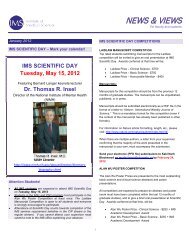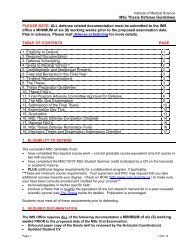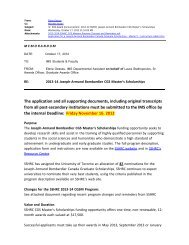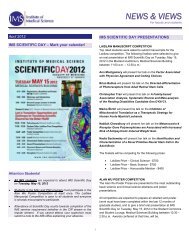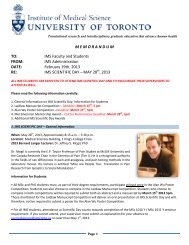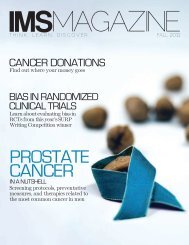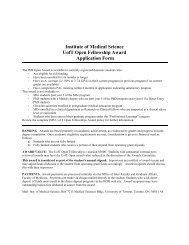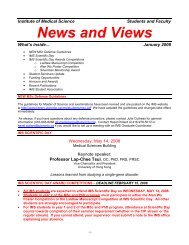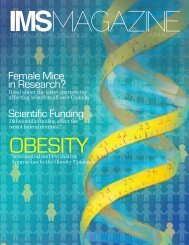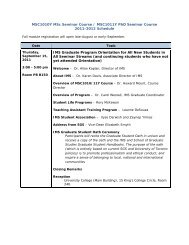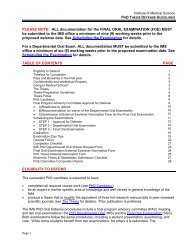IMS Magazine - Summer 2012 edition in PDF format - Institute of ...
IMS Magazine - Summer 2012 edition in PDF format - Institute of ...
IMS Magazine - Summer 2012 edition in PDF format - Institute of ...
Create successful ePaper yourself
Turn your PDF publications into a flip-book with our unique Google optimized e-Paper software.
VIEWPOINT<br />
Publish<br />
and Perish<br />
Why science takes two steps forward and one step back<br />
By S. Amanda Ali<br />
It is the dream <strong>of</strong> every scientist to<br />
publish a research article <strong>in</strong> Nature, Cell,<br />
or Science. For a graduate student work<strong>in</strong>g<br />
towards a PhD, a publication <strong>in</strong> one <strong>of</strong><br />
these prestigious journals almost guarantees<br />
a successful defense exam<strong>in</strong>ation, a reputable<br />
post-doctoral fellowship, and a subsequent<br />
tenure-track position. For a senior scientist<br />
manag<strong>in</strong>g a research lab, publications <strong>of</strong> this<br />
calibre provide an advantage <strong>in</strong> grant competitions<br />
and give greater stability <strong>in</strong> fund<strong>in</strong>g.<br />
For a research <strong>in</strong>stitution, high-impact publications<br />
draw global spotlight, attract better<br />
scientists, and earn the <strong>in</strong>stitution prestige.<br />
It therefore appears to be <strong>in</strong> everyone’s best<br />
<strong>in</strong>terest to publish <strong>in</strong> the highest impact<br />
journals possible, but this dream could be a<br />
nightmare <strong>in</strong> disguise.<br />
The higher the journal’s impact factor, the<br />
higher its retraction rate 1 . Reasons for retraction<br />
are distributed between misconduct and<br />
honest error, but the underly<strong>in</strong>g causes for<br />
these occurrences rema<strong>in</strong> largely unexam<strong>in</strong>ed.<br />
Executive editor <strong>of</strong> Science, Monica M.<br />
Bradford, defended this f<strong>in</strong>d<strong>in</strong>g <strong>in</strong> The New<br />
York Times by suggest<strong>in</strong>g that high-impact<br />
journals have a higher retraction rate because<br />
they receive more attention and are subject to<br />
more scrut<strong>in</strong>y 2 . While this may be the case, it<br />
implies that other, lower-impact journals also<br />
publish articles that violate ethical guidel<strong>in</strong>es,<br />
conta<strong>in</strong> scientific misconduct or error,<br />
or plagiarize previously published work, but<br />
that those articles go unnoticed. The end result<br />
is the same—our scientific literature is<br />
full <strong>of</strong> error, and that error is on the rise.<br />
A recent article <strong>in</strong> Nature reported that the<br />
number <strong>of</strong> retraction notices has <strong>in</strong>creased<br />
10-fold over the past decade, while publications<br />
have <strong>in</strong>creased by only 44% 3 . Although<br />
improved vigilance is a convenient and plausible<br />
explanation for this trend, there are<br />
other possible culprits. Astound<strong>in</strong>gly, 1-2%<br />
<strong>of</strong> scientists have admitted to fabricat<strong>in</strong>g, fal-<br />
sify<strong>in</strong>g, or modify<strong>in</strong>g data or results at least<br />
once 4 . A close exam<strong>in</strong>ation <strong>of</strong> the publish<strong>in</strong>g<br />
pipel<strong>in</strong>e reveals several po<strong>in</strong>ts where the<br />
pressure to publish may overwhelm an otherwise<br />
honest scientist, lead<strong>in</strong>g them to transgression.<br />
As mentioned, graduate students<br />
need to publish to build their future, and<br />
senior scientists need to publish to secure<br />
their future. This pressure to publish is compounded<br />
by the predom<strong>in</strong>ant bias to publish<br />
positive results more than negative results.<br />
(For a complete discussion <strong>of</strong> the research bias<br />
towards positive results, see “Positive Pressure,”<br />
<strong>in</strong> our Fall 2011 issue.) While only a m<strong>in</strong>ority<br />
<strong>of</strong> scientists may be will<strong>in</strong>g to fabricate or<br />
falsify results to fit their hypotheses, a majority<br />
<strong>of</strong> scientists may be <strong>in</strong>cl<strong>in</strong>ed to select data<br />
which support their hypotheses, and ignore<br />
data which do not.<br />
There lies the danger <strong>of</strong> predicat<strong>in</strong>g the success<br />
<strong>of</strong> a scientist on their publication record;<br />
the purpose for publish<strong>in</strong>g shifts toward<br />
Photo courtesy <strong>of</strong> www.istockphoto.com; ID # 16340434<br />
31 | <strong>IMS</strong> MAGAZINE SUMMER <strong>2012</strong> GENOMIC MEDICINE



